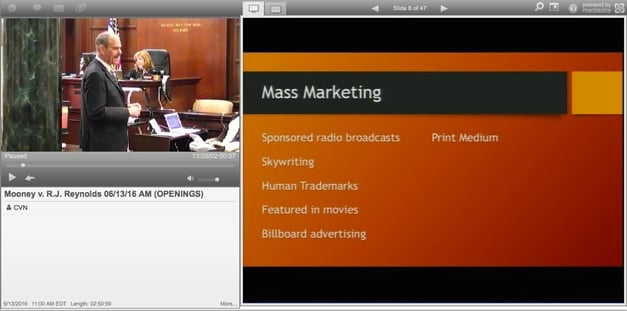
Plaintiffs' attorney Allan Kaiser delivers his opening statement. Click here to see video from the trial.
Miami - A Florida state court jury heard opening arguments on Monday in a lawsuit filed against R.J. Reynolds Inc. and Philip Morris USA by the widow of a woman who began smoking cigarettes as a teenager and died of lung cancer, accusing the companies of intentionally withholding the dangers of smoking from the public for years.
Plaintiffs Don Meacham and daughter Lesia Mooney sued the tobacco companies following the 1993 death of Barbara Meacham, who smoked up to two packs of cigarettes per day. Meacham claims his wife smoked for 15 years before the tobacco companies eventually added health warnings to cigarette packaging, but that by then she had already developed a serious addiction.
Meacham’s case is one of thousands of so-called “Engle progeny” tobacco lawsuits that are slowly working their way through state courts all across Florida. In 2000 a Florida jury saddled the tobacco companies with a record-setting $145 billion verdict in a historic class action trial, but that was later thrown out by the Florida Supreme Court which found that tobacco lawsuits needed to be tried individually due to the unique circumstances of each case.
The trial is being webcast live by Courtroom View Network, which has recorded nearly all of the individual Engle cases to go to trial after the class was decertified.
During his opening argument, Meacham’s attorney Allan Kaiser of the Ferraro Law Firm told jurors that Barbara Meacham, who began smoking in the late 1940’s at the age of 15, had consumed at least 934,400 doses of nicotine by the time the first warning labels were added to cigarette packaging in the 1960’s. Kaiser argued that when she first became addicted, Meacham had no way of knowing smoking was dangerous due to the tobacco companies “rabid” advertising efforts.
“They glamorized cigarettes, and the cigarette companies were responsible for creating a climate of normalcy at the time,” Kaiser said. “Everybody was smoking. Smoking was normal.”
By the time the first warning labels were added, Kaiser claimed the damage had already been done.
“During those 15 or so years, the cigarette companies knew that their products caused cancer and they knew that the nicotine in their cigarettes was addicting, and they didn’t tell members of the public like Barbara Meacham what they knew.”
Kaiser didn’t tell jurors a specific amount of compensation he would seek during the trial, but he said he would be asking for both compensatory and punitive damages.
Philip Morris’ attorney Kathleen Gallagher of Beck Redden LLP admitted to the jury that internal company documents from as far back as 70 years ago contained some “stupid things” and that Barbara Meacham did die of lung cancer, but Gallagher argued she chose to smoke cigarettes and was not addicted to nicotine.
Gallagher told jurors that Meacham was able to quit smoking on a number of occasions, sometimes for weeks at a time, and that even decades of heavy smoking don’t preclude someone from quitting if they are sufficiently motivated.
“You’re going to have to decide if she was really motivated and if she was really trying,” Gallagher said.
Representing R.J. Reynolds, Randal Baringer of of Womble Carlyle argued that Meacham only smoked their cigarettes for a brief period, and that they weren’t the likely cause of her cancer. He claimed Meacham smoked RJR-brand Pall Mall cigarettes from 1950 until 1960, but then switched to filtered cigarettes manufactured by Philip Morris until her death in the early 1990’s.
“I think the scientific evidence in this case is going to show that she did not smoke enough, or long enough for her risk to have actually increased at all,” Baringer said. “The evidence is going to show that for the first 5 or 10 years of smoking, a person’s risk doesn’t actually increase, and after this point it increases substantially.”
The case comes on the heels of two recent losses for RJR at Engle trials elsewhere in Florida. In May a Tampa jury socked RJR with an $11.5 million verdict, and later that month a Polk County jury hit the company with an $18 million verdict.
In April a Palm Beach County jury slammed Philip Morris with half of a $33.5 million verdict, split evenly with RJR, and in March Fort Lauderdale jurors returned a $350,000 verdict against Philip Morris that while substantial, is far below the average Engle plaintiff award that generally exceeds $1 million.
The current trial in Miami is taking place before Judge Barbara Areces.
The case is Mooney v. R.J. Reynolds Tobacco Company, et al., case number 11-40815, in Florida’s 11th Judicial Circuit in Miami-Dade County.
E-mail David Siegel at dsiegel@cvn.com






